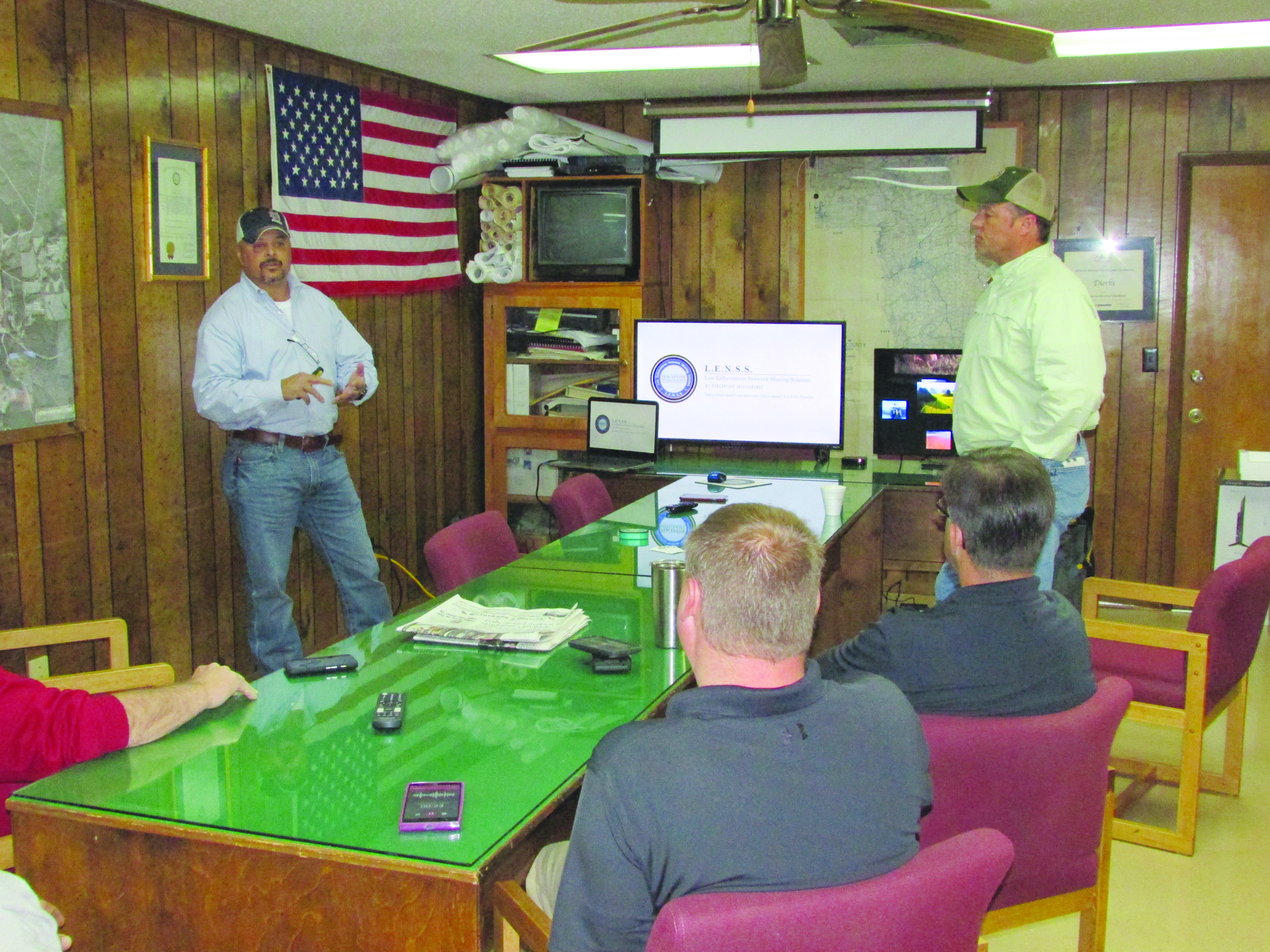NATASHA WORLEY
The Nashville News
On Thursday, April 14, two of the team members of the Law Enforcement Network Sharing Solution (L.E.N.S.S.) by Perceptive Intelligence made their way from Shreveport, LA to Dierks, AR to present the program to the mayor and the Dierks Police Department.
Russell Sarpy, Co-Founder and Director of Product Development at L.E.N.S.S., as well as Mark Davis, Senior Consultant, were on hand to display a slideshow and offer vital information about the program to the Dierks PD.
L.E.N.S.S. is a database through which law enforcement can communicate in real time. It is internet accessible from smartphones, tablets, or laptops, which means officers are able to take it wherever they go.
Dierks Mayor Terry Mounts described how the L.E.N.S.S. program made its way into Dierks, and how he thinks it will help his officers.
“A lady named Jeanene Deen (Director of Contracts, Grants, and Research), who is a local girl that grew up here in Dierks, approached me a couple of months ago. She sent me some videos and information about the program, and I figured it was something that our police officers could use. Our department is small, and our guys usually patrol by themselves. If it’s two or three o’clock in the morning, and you’re out pulling people over, you never know if it’s a routine traffic stop, or if it’s something more serious. With this program, they’ll have access to information that will help them on patrol. We are the first department in Arkansas to use L.E.N.S.S., and Jeanene offered it to us for free.”
Russell Sarpy then explained a bit about the background of the program to those present at the lecture.
“Everyone involved with the Perceptive Intelligence company are all current or former law enforcement personnel. We know what law enforcement needs, and created a program to meet those needs.”
According to Sarpy, the most important advantages of the program are to keep officers informed, keep them safe, and to further efforts to keep criminals off the street.
“The more information that law enforcement has, or can share about an individual when engaging with that individual, can further lead to the individual’s arrest,” he stated.
When asked how this is something different than what is available right now for law enforcement, he explained, “There is no database system other than NCIC that is a national database system that is available for all law enforcement to communicate on. NCIC doesn’t allow an officer to communicate with another officer. L.E.N.S.S. enables law enforcement to actually communicate while engaged in an event.”
Sarpy then stated that the overall goal of the company is to spread to further parts of the country, and keep more officers informed.
“We’ve got 21 agencies in Louisiana on the system and others with contracts pending. This is our first effort to get outside of the state, and we started with Dierks, Arkansas. We’re excited to have their participation.”
Jeanene Deen also reached out to us for comment, and expressed her concerns about the loss of information and the silo of intelligence. “We must prevent the criminal element from lying low,” she said. “The pivot point of safety is intelligence.”
Deen cited examples of how the L.E.N.S.S. program could cease this “silo” effect.
“Texarkana has been a ‘stop-off- point’ for people committing crimes in Texas and Louisiana. In this order, the UT-Austin student murdered at the hands of a young man from the Texarkana area – L.E.N.S.S. use could have documented the possible violent behavior individual and propensity to be dangerous – L.E.N.S.S. use could have allowed the campus police to better react and know who this person is/was – L.E.N.S.S. could have been used to insert alert of Parent/Guardian feature.
The later example of Louisiana: the man who shot the people in the Lafayette movie theater was stated to have been at the movie theater in Texarkana the day (evening) before. On Facebook, I was alerted that a woman and her child (daughter) complained of his actions and behavior in Texarkana, the night or day prior to the shootings in Lafayette – this man drove south into Louisiana, down I-49 to Lafayette and the rest is a terrible outcome. We know more about vehicles entering the state of Louisiana than ever before, yet the silo of information in Texas, Oklahoma and Arkansas causes a ‘disconnect and loss’ – how can we be more concerned over objects than people?
This chasm of information loss is slowing the wheels of justice and allowing criminals and dangerous persons to filter through the sieve of law enforcement. Congruent flow of intelligence from an officer in Texarkana, for example, must be available for Austin and Lafayette. LIVES depend on this cross-pollination of information.”
For more information about L.E.N.S.S. and Perceptive Intelligence, please see the March 21 issue of The Nashville News, or visit www.perceptiveintelligence.com








